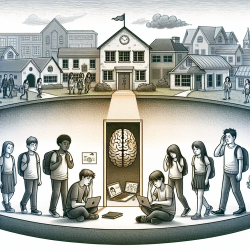As a practitioner dedicated to improving outcomes for children, you might find it fascinating to explore the recent research published in Frontiers in Psychology, titled "Influence of Turn-Taking in Musical and Spoken Activities on Empathy and Self-Esteem of Socially Vulnerable Young Teenagers." This study sheds light on how structured turn-taking activities in music and language can significantly enhance empathy and self-esteem in socially vulnerable young teenagers.
In the study, 22 teenagers aged 12-14 participated in six one-hour sessions that included musical improvisation, language games focusing on linguistic rhythm and melody, and crossover activities like rap. The participants were divided into two groups: the Turn-Taking group, which engaged in activities emphasizing turn-taking and predicting others' actions, and the Synchrony group, which performed similar activities but focused on synchronous action without turn-taking.
The results were compelling. The Turn-Taking group showed a significant increase in empathy as measured by both self-report (Toronto Empathy Questionnaire) and behavioral tests (Reading the Mind in the Eyes). Additionally, they exhibited improved scores in the General subtest of the Culture-Free Self-Esteem Inventory. In contrast, the Synchrony group did not show significant changes in these areas.
Practical Implications for Practitioners
Here are some actionable insights from the study that you can implement in your practice:
- Integrate Turn-Taking Activities: Incorporate structured turn-taking activities in both musical and spoken interactions. This could involve call-and-response songs, improvisational drumming, or language games that require participants to take turns speaking or performing actions.
- Focus on Predictive Skills: Design activities that require participants to predict what others will do next. This enhances their attention to others and helps develop empathy.
- Combine Music and Language: Use a mix of musical and linguistic activities to keep sessions engaging and multifaceted. Activities like rapping or chanting can bridge the gap between music and language, making the sessions more dynamic.
- Tailor to Individual Needs: Adjust the complexity of activities based on the participants' abilities and progress. This ensures that each child remains engaged and can achieve measurable improvements.
Encouraging Further Research
While the study provides promising results, it also highlights the need for further research. Larger sample sizes and more diverse demographic groups could help validate these findings. Additionally, exploring the long-term effects of such interventions would provide deeper insights into their lasting impact on empathy and self-esteem.
As practitioners, staying informed about such research can guide us in adopting evidence-based methods that truly make a difference in children's lives. Implementing these findings in your practice could lead to more empathetic, confident, and socially adept young individuals.
To read the original research paper, please follow this link: Influence of Turn-Taking in Musical and Spoken Activities on Empathy and Self-Esteem of Socially Vulnerable Young Teenagers.










